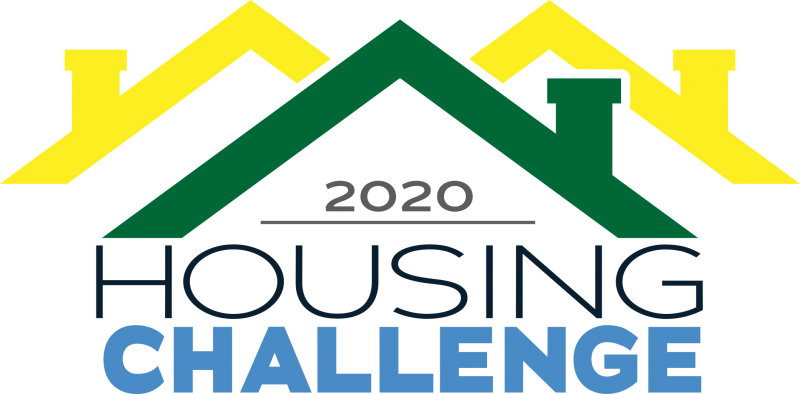Full 2020 Housing Challenge Photo Gallery
Innovative Efforts Already Underway
At the event, participants were presented with some of the creative efforts already underway, ranging from non-traditional partnerships to creative uses of land, to new funding methods.
“If we do this right and we commit ourselves to innovation, this problem is solvable,” said Carmen Romero, vice president at the nonprofit Arlington Partnership for Affordable Housing (APAH).
For example, she pointed to their partnership with a Presbyterian Church for the development of Gilliam Place – a mixed-use community with 173 affordable apartments on a one-acre lot along Columbia Pike in Arlington. The building also incorporates the church’s new space on the first floor, along with La Cocina, a kitchen incubator and job training program.
Fairfax County and the Fairfax County Redevelopment and Housing Authority (FCRHA) is creatively reusing what used to be a state-owned stormwater pond for senior housing. The FCRHA is working with APAH on a project called Oakwood Residences. It will create 150 units of affordable housing within walking distance to the Van Dorn Metro Station.
“I know our board is ready to go on looking at where we have underutilized property that we can build affordable housing on throughout the county,” said McKay.
Oakwood is also an example of how the county is combining partnerships, underused land and government funds to build new affordable housing. As the county proposes to increase the funds dedicated to affordable housing—yielding nearly $40 million a year for it if approved in the budget—this project demonstrates how creativity and greater resources can produce results.
“It’s about how do we take that $40 million and leverage it with the private sector to stretch it into something far larger,” said McKay.
The county is already carrying out its existing plan to build a minimum of 5,000 affordable homes in the next 15 years. Under the Communitywide Housing Strategic Plan, which was adopted by the Board of Supervisors last year, there are already more than 1,100 units in the pipeline.
New Ideas Presented at the Hackathon
At the hackathon, new ideas were presented that will help advance the county’s ongoing efforts.
Five teams addressed ways to building public support for affordable housing, engage partners to create more housing and involve faith communities in developing housing.
Judges evaluated the proposed solutions and cash prizes were awarded to the top three teams.
The winning team proposed an advertising campaign to build public understanding and support for affordable housing. The group recommend highlighting the challenges faced by different types of county workers and residents and highlighting the impacts to community when these residents can’t afford to live in the county.
Another team pitched a home-sharing platform that matches older homeowners who need help to stay in their homes with younger people looking for housing. These younger renters would help homeowners around the house in addition to securing affordable housing.
Other ideas included repurposing underused parking lots for housing. A team suggested repurposing the parking lot at the Willston Multicultural Center, and partnering with nearby businesses, nonprofits and hospital to provide services, jobs and help building the affordable units.
Groups also suggested a number of suggestions relative to engaging communities of faith, using underutilized land to develop affordable housing, facilitating the development process, and considering new investor relationships that can advance affordable housing.
Next Steps
Fairfax County staff from the Department of Housing and Community Development will be reviewing and considering all options presented at the 2020 Housing Challenge relative to the advancement of housing affordability throughout the county and in support of the Communitywide Housing Strategic Plan.
“This event has been incredibly important in bringing together leaders from across the spectrum,” said Tom Fleetwood, Director of the Fairfax County Department of Housing and Community Development, “in order to identify new opportunities – creative out-of-the-box thinking – to help everyone in Fairfax County who needs a place to call home to have a place to call home.”


